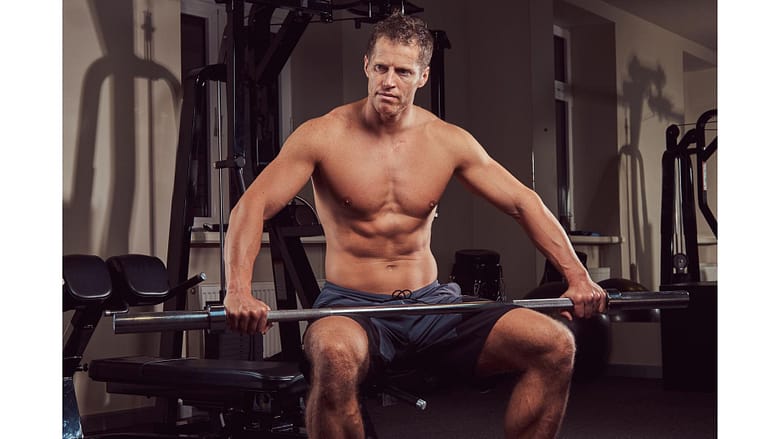
Table of Contents
ToggleBlood Pressure Shifts:
When you squat, especially with heavy weights, your body undergoes significant changes. The exertion demands increased oxygen and energy, prompting your heart to pump harder. As a result, blood flow to your muscles surges, diverting blood away from your brain momentarily. This abrupt change in blood pressure can lead to feelings of dizziness or lightheadedness.
Breathing Technique:
Your breathing pattern during heavy squats can also contribute. Holding your breath or improper breathing techniques can cause a sudden increase in intra-abdominal pressure, affecting blood flow and oxygenation to the brain.
Dehydration or Nutrition:
Factors like dehydration or inadequate nutrition can intensify this sensation. Insufficient hydration can affect blood volume and pressure regulation, making you more susceptible to feeling lightheaded during intense workouts.
Tips to Manage Dizziness While Squatting:
Breathing Techniques:
Focus on controlled breathing throughout the squat. Inhale deeply before descending, exhale on the way up, and maintain a consistent rhythm to stabilize blood pressure.
Stay Hydrated and Nourished:
Ensure proper hydration before and during your workout. Consuming a balanced meal or snack with carbohydrates and protein prior to training can provide essential energy.
Gradual Progression:
Avoid sudden jumps in weight. Gradually increase the load to allow your body to adapt, reducing the likelihood of overwhelming changes in blood pressure.
Rest Between Sets:
Give yourself ample rest between sets to recover and allow blood pressure to stabilize.
Proper Form:
Maintaining correct squat form is crucial. Proper technique not only minimizes the risk of injury but also helps in managing the physiological stress on your body.
So.
Experiencing dizziness or lightheadedness while squatting heavy is a common occurrence rooted in physiological responses to intense exertion. Implementing proper breathing techniques, ensuring adequate hydration and nutrition, and gradually progressing in your training can significantly reduce these sensations.
While it’s normal to feel a bit dizzy occasionally, persistent or severe dizziness might indicate underlying health issues. If you consistently experience this feeling, it’s wise to consult a healthcare professional for guidance and evaluation.
Remember, prioritize your safety and well-being while pursuing your fitness goals!
Let’s delve a bit deeper into this common issue.
Exploring Deeper into the Dizziness Phenomenon:
Vasovagal Response:
Sometimes, the dizziness or lightheadedness can be attributed to the vasovagal response. This reaction occurs when your body overreacts to certain triggers like intense physical exertion, leading to a sudden drop in heart rate and blood pressure. It’s a protective mechanism, but it can cause temporary dizziness or even fainting.
Hyperventilation:
Rapid or shallow breathing while squatting can lead to hyperventilation, altering the balance of oxygen and carbon dioxide in your blood. This can affect cerebral blood flow, contributing to feelings of lightheadedness.
Individual Differences:
Each person’s body reacts uniquely to physical stress. Some individuals may be more prone to feeling dizzy during heavy squats due to variations in cardiovascular fitness, hydration levels, or even genetic predispositions.
Strategies to Counter Dizziness:
Mindfulness and Focus:
Maintaining mental focus and mindfulness during your workout can help regulate breathing and improve oxygenation, reducing the likelihood of feeling dizzy.
Posture and Alignment:
Ensuring proper posture and spinal alignment throughout the squat can minimize unnecessary strain on your body, potentially decreasing the risk of feeling lightheaded.
Recovery and Cool Down:
After a strenuous set of squats, allow yourself a moment to recover. Implementing a cool-down routine can help stabilize your body and reduce the chances of experiencing dizziness post-workout.
Seek Professional Guidance:
If dizziness persists or becomes a frequent occurrence, seeking guidance from a fitness trainer or healthcare professional is advisable. They can provide personalized advice, assess your form, and rule out any underlying health concerns.
Final Thoughts:
Remember, feeling dizzy or lightheaded during heavy squats isn’t always cause for alarm. It’s often a temporary response to the intense physical demands you place on your body. By understanding the physiological factors at play and implementing practical strategies, you can effectively manage and potentially reduce these sensations.
However, always prioritize safety and health above all else. If the dizziness persists, worsens, or is accompanied by other concerning symptoms, seeking professional guidance is crucial.
For more insights into workout-related symptoms or strategies to enhance your fitness journey, consider exploring the following resources:
Squat University – Breathing Techniques for Squats
Healthline – How to Avoid Dizziness During Exercise
Verywell Fit – Hyperventilation During Exercise
PubMed Central – Vasovagal Syncope
American Council on Exercise – Breath Awareness During Exercise
Remember, your fitness journey should be both rewarding and safe. Embrace the process, listen to your body, and keep exploring techniques that work best for you!
Comparison tabular
| Factors | Contribution to Dizziness | Strategies to Manage |
|---|---|---|
| Blood Pressure Shifts | Sudden changes in blood flow from exertion | Proper breathing techniques, gradual progression in weights |
| Breathing Technique | Improper breathing patterns affecting blood pressure | Focus on controlled breathing, maintain a consistent rhythm |
| Dehydration or Nutrition | Inadequate hydration/nutrition affecting blood volume | Ensure proper hydration, consume balanced meals/snacks |
| Vasovagal Response | Overreaction triggering drop in heart rate/blood pressure | Mindfulness, focus, and seeking professional guidance |
| Hyperventilation | Rapid/shallow breathing altering blood oxygen/carbon dioxide | Emphasis on posture, recovery, and cool-down routines |
| Individual Differences | Variances in fitness levels, hydration, and genetic factors | Personalized guidance, seeking professional assessment |
This table provides a concise overview of the contributing factors and strategies to manage dizziness/lightheadedness during heavy squats. Understanding these elements can help individuals adopt tailored approaches to enhance their workout experience and mitigate these sensations effectively.
Wrapping it up
Navigating the sensation of dizziness or lightheadedness while squatting heavy is a journey that many fitness enthusiasts encounter. It’s important to recognize that this experience, while common, can be managed effectively with awareness, technique refinement, and a focus on overall well-being.
By acknowledging the physiological factors at play, embracing proper breathing techniques, staying hydrated, and seeking guidance when needed, you can enhance your workout experience and minimize the occurrence of dizziness during heavy squats.
Always remember, your fitness journey is unique, and what works for one person might differ for another. Listen to your body, prioritize safety, and seek professional advice if you encounter persistent or concerning symptoms.
Ultimately, fitness is about not just reaching goals but also enjoying the process. Embrace the challenges, celebrate your progress, and keep exploring techniques that align with your body’s needs. Your health and well-being should always remain at the forefront of your fitness endeavors.
Stay mindful, stay motivated, and enjoy your journey toward a healthier, stronger you!

Hey there, it’s Mike Rrsq, the Editor-in-Chief over at Jsquat.com, and I’m absolutely obsessed with all things squat fitness! I’ve been lucky enough to get some serious recognition for my work in this field. With a solid background in the fitness and wellness industry, I’ve been there right from the get-go, helping shape this website into what it is today.
You see, I’m not just the boss around here; I’m also a passionate contributor. I love sharing my insights through my articles, and trust me, they’re not your run-of-the-mill stuff. Each piece I write is a labor of love, filled with my expertise and real-world experience in the fitness universe. So, if you’re into fitness and looking for some inspiration, you’re in the right place!
Related Posts
- Should I squat heavy to sprint faster (Explained)
Sprinting is a popular and demanding athletic activity that requires explosive power and speed. Athletes…
- What If you're Not Comfortable Squatting? Tips to Help You Overcome Your Squatting Struggles
If you're not comfortable with squatting, there are a few things you can try. Firstly,…
- Why Do I Feel Dizzy When I Squat (Explained)
Are you experiencing dizziness when you squat? Don't worry, you're not alone. Read on to…
- Should I Squat Heavy To Jump Higher? (Explained)
Want to improve your vertical jump? Find out whether or not heavy squats are the…
- Should you use weights while squatting for toning purposes.
Absolutely. incorporating weights into your squat routine can be incredibly beneficial when toning your muscles.…
- How To Know If You're Squatting Low Enough: Tips and Techniques
Knowing if you're squatting low enough can be tricky, but it's important for both safety…
- Why Can’t I squat heavy? (Explained)
Struggling to increase your squatting weight? Read on to learn the possible reasons why you…
- Should You Always Wear Knee Wraps While Squatting? (Explained)
Listen up, all you lifters out there! There's been some debate lately about whether knee…

